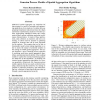Free Online Productivity Tools
i2Speak
i2Symbol
i2OCR
iTex2Img
iWeb2Print
iWeb2Shot
i2Type
iPdf2Split
iPdf2Merge
i2Bopomofo
i2Arabic
i2Style
i2Image
i2PDF
iLatex2Rtf
Sci2ools
103
click to vote
IJCAI
2003
2003
Gaussian Process Models of Spatial Aggregation Algorithms
Multi-level spatial aggregates are important for data mining in a variety of scientific and engineering applications, from analysis of weather data (aggregating temperature and pressure data into ridges and fronts) to performance analysis of wireless systems (aggregating simulation results into configuration space regions exhibiting particular performance characteristics). In many of these applications, data collection is expensive and time consuming, so effort must be focused on gathering samples at locations that will be most important for the analysis. This requires that we be able to functionally model a data mining algorithm in order to assess the impact of potential samples on the mining of suitable spatial aggregates. This paper describes a novel Gaussian process approach to modeling multi-layer spatial aggregation algorithms, and demonstrates the ability of the resulting models to capture the essential underlying qualitative behaviors of the algorithms. By helping cast class...
Related Content
| Added | 31 Oct 2010 |
| Updated | 31 Oct 2010 |
| Type | Conference |
| Year | 2003 |
| Where | IJCAI |
| Authors | Naren Ramakrishnan, Christopher Bailey-Kellogg |
Comments (0)

